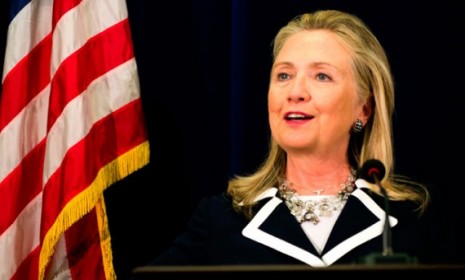Should the U.S. end Cold War sanctions against Russia?
The Obama administration says it's time to normalize trade relations with Moscow. 'Not so fast,' say Republicans, including Mitt Romney

A free daily email with the biggest news stories of the day – and the best features from TheWeek.com
You are now subscribed
Your newsletter sign-up was successful
Secretary of State Hillary Clinton is promising Russia that the U.S. will soon lift trade sanctions that date back to the Cold War. To many, the move seems like a no-brainer, given that the Soviet Union — and, with it, the Cold War — collapsed more than two decades ago. But it's not clear yet whether Congress will endorse the move; many Republicans want to make sure we still have ways to punish Russian officials who commit human rights abuses. Are the trade sanctions a Cold War relic the U.S. should put to rest, or should we hold off on loosening the screws just yet? Here, a brief guide:
Wait, we're still punishing Russia for what the Soviets did?
Yes and no. A measure called the Jackson-Vanik amendment was passed in 1974 to pressure Moscow to let Soviet Jews leave the country. That ceased to be an issue when the Soviet Union fell apart, but Congress kept the amendment on the books as leverage against the new government in Russia on other issues. Instead of enforcing the sanctions, however, the U.S. simply waives them each year.
The Week
Escape your echo chamber. Get the facts behind the news, plus analysis from multiple perspectives.

Sign up for The Week's Free Newsletters
From our morning news briefing to a weekly Good News Newsletter, get the best of The Week delivered directly to your inbox.
From our morning news briefing to a weekly Good News Newsletter, get the best of The Week delivered directly to your inbox.
Why the push to normalize relations now?
Russia just joined the World Trade Organization, and keeping the sanctions on the books violates the W.T.O's rules. Besides, Clinton says, normalizing relations is the only way to let American businesses derive benefits from Russia's membership in the global trade organization, such as lower tariffs on American goods sold in Russia. Still, a stumbling block on Capitol Hill could prevent the Obama administration from delivering on Clinton's pledge.
What's that?
It's a piece of human rights legislation called the Magnitsky bill, named after a young Russian lawyer, Sergei Magnitsky, who died suspiciously in prison after being arrested on allegedly trumped up charges. The bill would impose stiff sanctions on Russian officials suspected of human rights abuses, and it has support from Democrats and Republicans alike, but President Obama and his GOP rival, Mitt Romney, are clashing over when it should be passed.
A free daily email with the biggest news stories of the day – and the best features from TheWeek.com
How do they disagree?
Romney, like many of his fellow Republicans in Congress, wants the Magnitsky bill passed pronto. In fact, they don't want to lift the old trade sanctions until the Magnitsky legislation passes. The Obama administration says we should, by all means, address human rights abuses in Russia, but that the Magnitsky bill is too broad to pass as is. Furthermore, they feel it's a mistake to mix the human-rights issue with the effort to develop more mutually beneficial economic ties with Russia.
What happens next?
Romney has made the matter an issue in the presidential campaign. His campaign says Obama's opposition to the Magnitsky bill is part of his "overall reluctance to shine a light on human rights abuses in Russia." Team Obama says removing the old sanctions is a necessary part of resetting relations with Russia in a way that benefits both countries. Now that Russia has joined the W.T.O., it has the right to retaliate against U.S. businesses. "All of this is a perfect example of how domestic politics works to keep an obsolete sanction in place," says Paul R. Pillar at The National Interest. It's easy to impose sanctions, but hard to lift them, even long after the reason for their existence is long gone. Let that be a lesson to Congress as it considers how to handle today's foes, such as Iran. "Don't expect even regime change to eliminate the problem; after all, there has been some regime change in Moscow since the 1970s."
Sources: BBC News, CNN, National Interest, New York Times